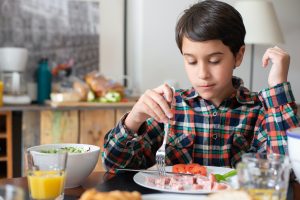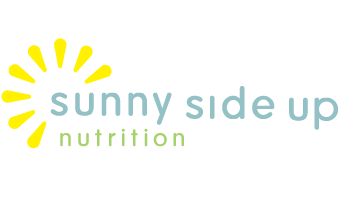Diet culture has seeped into the way we talk and the way we parent. What is diet culture? Diet culture is the idea that certain bodies and ways of eating are morally superior to others. Diet culture tells us in blatant and more subtle methods, that we all should be working towards looking and eating in these certain ways. The message is we must use external rules and guidance to control our food and bodies to be morally acceptable.
Parenting Under the Influence of Diet Culture.
These ideas have taken hold in the way we talk to ourselves, our friends, and our children. When we parent under the influence of diet culture, we may be teaching our children they can’t be trusted. We are teaching that their internal cues and desires can’t be trusted, and their bodies can’t be trusted to gain and grow on their own.
This is contradictory to supporting a child in gaining autonomy and trusting themselves in making wise and sound decisions. Diet culture erodes a parent in supporting their child in gaining self-confidence, awareness, and trust. 
Just last week, I arrived at an event and someone told me the food they were eating was “undoing” their day’s workout. Hearing something like this is a stark contrast to the culture I am in at my anti-diet nutrition practice, but I’m also aware I’m the “odd” one out in the “world.”
Language like this is fairly commonplace in our society. It’s almost as commonplace as saying, “How was your day?” In our culture, it can take intention and courage to use language that is more in line with Responsive Feeding, rather than diet culture. For many, this is intuitive and may be the way you were raised. For others, this may feel very counter to the messages you are hearing around you or how your parents talked about food and bodies.
What is Responsive Feeding
Responsive feeding is an approach to feeding that puts the focus on the relationship between caregiver and child and strives to support the child’s internal cues, curiosity, and autonomy. You can read more about Responsive Feeding therapy here. Diet culture interferes with a person’s ability to tune in; responsive feeding supports it.
The language we use as parents can influence our children throughout their lifetime. Our language can influence our children’s internal dialogue. How we talk about food and bodies is extremely important and a piece of eating disorder prevention.
How We Talk About Food and Bodies

How we talk about food
The language we use as parents can influence our children throughout their lifetime. Our language can influence our children’s internal dialogue. How we talk about food and bodies is extremely important and a piece of eating disorder prevention.
So often food is discussed in “good” and “bad” terms. Food is labeled “healthy” or “unhealthy.” Notice as you go through your day how often food is referred to in a moralistic way, or a person labels themselves in a moralistic way in relation to what they have or haven't eaten.
- “I was so ‘bad’ this morning. I ate a doughnut!”
- “No thank you, I’m being “good” today.”
- "I know this food is so bad!"
- "We're eating good now, because later we'll be bad."
Just noticing this moralistic language that is a part of our everyday rhetoric can be a concrete initial step to shifting language. Just notice. The next step may be to challenge yourself to not talk about food in moralistic ways. Food is food.
What if, instead, we experimented with discussing foods with its matter-of-fact attributes -- food is crunchy, chewy, tart, spicy, hot, or cold. Or, you might talk about food based on your opinion of how it tastes.
- “That is really yummy!”
- “That is too tangy for me, what do you think?”
- “Mmmm. I’m quite full. I must have been really hungry!"
We also might discuss food in how it relates to our memories or emotions.
- "This pie makes me so happy. It reminds me of my father."
- "I love watching you eat that ice cream. I can tell how much you love it."
- "This warm soup makes me feel better after such a hard day."
Food and emotions are linked and we can model that this is true and acceptable. How we talk about our children’s eating: 
Have you found yourself trying to control your child’s eating? “Slow down.”

Leave a Reply